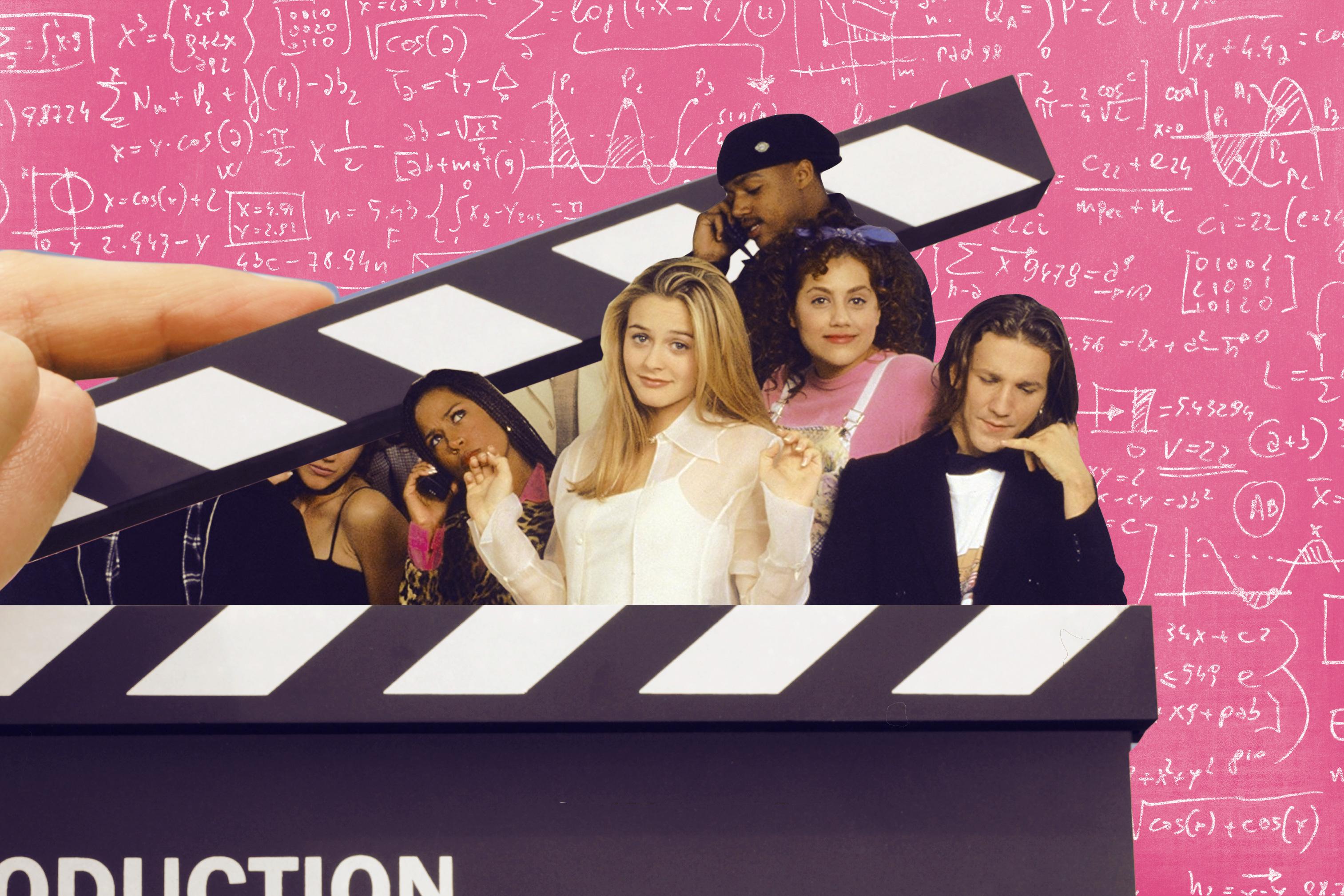
On Thursday, the announcement that Hollywood would be remaking yet another beloved ’90s classic was met with an online chorus of “as if,” “way harsh,” and “I am totally buggin’.” That’s right: As Deadline reported, Paramount is planning to make a new Clueless—which itself is a modern spin on Jane Austen’s 1815 novel Emma. (Complicating matters even further was the news on Thursday that Anya Taylor-Joy will star in an upcoming Emma adaptation, which is a different project than the Clueless remake.)
The Clueless news hit The Ringer staff pretty hard. “I am admittedly feeling pretty man-on-the-internet-reacting-to-Ghostbusters-remake about Clueless,” Ringer staff writer Katie Baker wrote in Slack. “I will try to keep an open mind but it will be very difficult.”
Here’s my take: Same. Clueless is sacred art; I can’t even count the number of times I was forced to rewatch the film with my sister, who, as the eldest sibling, had VCR authority by law. (I made a big fuss of it, but damned if this wasn’t a good movie.) And yet, the remake will be scripted by Marquita Robinson, a writer on the excellent Netflix series GLOW. So how should one feel about this?
Thankfully, there’s a statistical way to determine how necessary a remake actually is. In 2017, my Ringer colleague Ben Lindbergh created a 10-step rubric to try to make a reasonable estimation for how much we need a White Men Can’t Jump remake. (Turns out we really don’t need one.) And since we shouldn’t mess with something that already works, we’re going to use the Lindbergh’s Actual Remake Necessity Score—LARNS for short—and apply it to the new Clueless. But before we crunch the numbers, let’s go through the rubric again.
1. How Old Is the Original?
The ’90s seem to the latest craze for Hollywood remakes, which supports Lindbergh’s previous theory that 20 to 30 years is the Hollywood remake sweet spot. (With exceptions, of course; we had to wait even longer for another star to be born.)
Scoring: Award one point for every year since the original debuted.
2. How Beloved/Respected Is the Original?
This one’s pretty simple: If the original version of the project is already super beloved, it’s harder for the remake to improve upon it. However, if there’s less of a unified consensus and the original film has some flaws, then a remake may not be as sacrilegious as it seems.
Scoring: Multiply the movie’s IMDb user rating by 10 to place it on the same scale as the Rotten Tomatoes rating. Then take the average of the two ratings, subtract it from 100, and add the result to the point total.
3. How Well Did the Original Perform at the Box Office?
The stronger the original movie performed at the box office, the greater the odds that the remake will have a strong impact. Granted, this is of more interest to the studios making the movie than the fans who aren’t on board with retconning the IP.
Scoring: Look up the original movie’s domestic gross at Box Office Mojo (or another source) and plug it into an inflation calculator to get an inflation-adjusted total in the most recent year’s dollars. If it’s less than $100 million in present-day dollars, add the difference to the point total; if it’s more, subtract the difference from the point total.
4. How Active Is the Original’s Cast?
If members from the original’s cast are no longer mainstays in Hollywood, a remake makes more sense—it’s easier to market something when the stars from the original film aren’t still doing big things.
Scoring: Add up the IMDb credits of each of the original’s lead actors (defining “lead” however you like) in the current year and the previous two years, including only movie roles and recurring TV roles. Take the average of every lead’s score, multiply it by five, and subtract it from 50. Then add the remainder to the remake’s point total.
5. Was the Original a Foreign Film? If So, Did It Have Subtitles?
To quote Lindbergh, because this is perfect: “It’s downright un-American to suggest that any foreign film couldn’t be even better if we manufactured the remake right here in the US of A and made all the actors speak English, the US of A’s official language.”
Scoring: Add 50 points for foreign films, and double that if the original also had subtitles, because text and movies don’t mix.
6. Is the Original Reliant on Special Effects? If So, How Dated Do They Look?
Not all movies, especially blockbusters, stand the test of time. See: the original Tron. If a remake can improve upon the original with up-to-date special effects that will bolster the cinematic experience, it’s all the better for it.
Scoring: Rate the effects’ datedness on a scale from one to five, adding 10 points for each step up the scale. Use your judgment, but for a rough calibration: Add 10 points for CGI Jabba the Hutt (either edition); 20 for The Abyss; 30 for The Last Starfighter; 40 for Logan’s Run; 50 for Kirk vs. Gorn.
7. Was the Original Filmed in Black and White?
That’s if the original is super old—or if some Hollywood exec decided The Artist was better in color the entire time.
Scoring: If the original was filmed in black and white, add 50 points to the remake’s point total.
8. Is the Original Racist, Sexist, or Distractingly Censored?
Movies that are sacrosanct in the moment don’t always meet modern standards. Sixteen Candles is the ultimate litmus test—that would never work now without major revisions.
Scoring: Add 20 points for racism, 20 points for sexism, and 10 points for Hays Code–era pants that had to stay above the belly button.
9. Will the Remake Somehow Subvert or Put a Fresh Spin on the Original?
The best remakes aren’t going to recycle all the familiar plot elements without attempting a contemporary take that can toe the line between paying deference to the original and trying something new.
Scoring: Add 20 points if the new cast’s makeup is dramatically different. Add 20 points if the story is set far in the future or past, relative to the original. Add 10 points if the protagonist’s geographic location or economic condition is dramatically different. (Think third world vs. first world more so than, say, Minneapolis vs. St. Paul.) If these details aren’t yet known, omit this category from the calculations.
10. Was the Original Inseparable From Its Era?
Movies that are indebted to the era they were made in would have a more difficult jump if a remake was modernized. For instance: It’s hard to imagine Saturday Night Fever taking place in any era but the disco era, which is good to keep in mind if Zac Efron ever decides to star in a new one.
Scoring: Subtract 25 points if the original’s milieu was a core part of its appeal. Subtract another 25 points if the plot wouldn’t work as well without it.
In sum: Anything under 100 points would be deemed unnecessary, and the remake would have a mountain to climb to live up to expectations (White Men Can’t Jump scored a flat 11, so it would really need everything to break right); something in the 100-200 point range is a justifiable update that should have an easier time sticking the landing; and anything above 200 points is simply a great idea, and should be green-lit immediately, if it hasn’t been already.
Applying the LARNS method to the Clueless remake, here’s how the scoring breaks down:
1. How Old Is the Original?
Clueless came out in 1995, and though we don’t know when the remake will be released, the news was announced in 2018. So that’s 23 years, meaning 23 points.
2. How Beloved/Respected Is the Original?
Fairly beloved. The IMDb user rating for Clueless was a 6.8, and multiplied by 10 and averaged out with the Rotten Tomatoes score of 80 percent, we’re looking at a 74 average. Subtracted from 100, we’ve got 26 points.
3. How Well Did the Original Perform at the Box Office?
Clueless made $56.6 million domestically—which, when adjusted for inflation, would equate to $93.8 million today. To keep things as smooth as possible, let’s just round that up to $94 million, and since that’s below the $100 million mark, we’ll add another six points to the Clueless remake total.
4. How Active Is the Original’s Cast?
For this exercise, I considered Alicia Silverstone, Stacey Dash, and Paul Rudd—though there is an unfortunate discrepancy because fellow lead Brittany Murphy died in 2009. But the aforementioned leads have a combined 21 IMDb credits from movies and recurring TV roles—I gave Stacey Dash a point for all of her Fox News appearances—since 2016, making an average of seven roles each. Multiplied by five, we have 35 points, which, subtracted from 50, makes for another 15 points.
5. Was the Original a Foreign Film? If So, Did It Have Subtitles?
Clueless was not; therefore, zero points are added.
6. Is the Original Reliant on Special Effects? If So, How Dated Do They Look?
Clueless does not rely on special effects, so zero points will be added or subtracted from the total.
7. Was the Original Filmed in Black and White?
The original was not filmed in black and white, so, once again, that’s zero points.
8. Is the Original Racist, Sexist, or Distractingly Censored?
Clueless wasn’t distractingly censored; catchphrases like “as if,” “totally butt crazy in love,” and “snob and a half” were just part of the weird nomenclature. Zero points.
9. Will the Remake Somehow Subvert or Put a Fresh Spin on the Original?
Unfortunately, it’s too early in the Clueless remake process to give this a determinable score. This is worth revisiting closer to the film’s release, when more plot details and casting announcements are unveiled. So far, zero points.
10. Was the Original Inseparable From Its Era?
Clueless is basically a Jane Austen novel distilled in the most ’90s way imaginable. It is most certainly inseparable from its era—all the way down to the students’ outdated fashion. For the remake, we’re subtracting 25 points.
The Final Verdict
I’ll say this about the Clueless remake: It’s definitely more necessary than White Men Can’t Jump, but almost anything would be, and it didn’t fare much better. All told, the Clueless remake garnered 45 points through the LARNS system, which isn’t terrible, but does support the prevailing online sentiment that this new film faces an uphill battle to feel like a necessary follow-up.
Of course, the movie’s total could increase once we learn more about Robinson’s approach to the script, who else might sign onto the project, and how the remake will be modernized for 2018. However, even the most optimistic spin means a score below 100 LARNS points, so the fact remains: A lot of things will need to go right for moviegoers to be butt crazy in love with the new Clueless.

